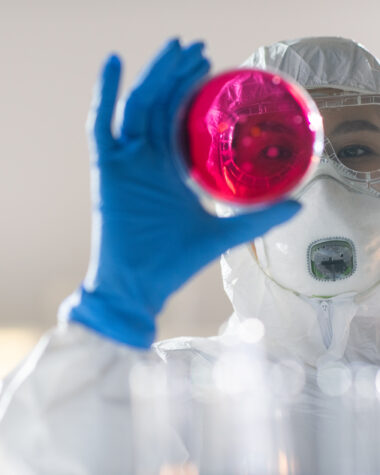Intellia Therapeutics, Inc. (NASDAQ:NTLA) is a biotechnology company at the forefront of a genomic revolution, pioneering the development of curative therapies through CRISPR/Cas9 gene-editing technology. Founded in 2014 and headquartered in Cambridge, Massachusetts, Intellia emerged from the groundbreaking scientific research of CRISPR co-inventor Dr. Jennifer Doudna, a Nobel Prize laureate whose work fundamentally transformed how scientists approach genetic diseases. Intellia’s inception marked the beginning of a bold new chapter in modern medicine—one where precision gene editing could be harnessed not just in the lab but inside the human body to correct disease at its genetic root.
From its earliest days, Intellia has been dedicated to unlocking the full potential of CRISPR for therapeutic use, establishing itself as a global leader in both in vivo and ex vivo genome editing. The company was one of the first to validate CRISPR/Cas9 in a systemic, in vivo setting, using its proprietary lipid nanoparticle (LNP) delivery system to successfully edit genes directly within the human body. This historic achievement, first demonstrated in 2021 with its lead candidate NTLA-2001 for transthyretin amyloidosis (ATTR), positioned Intellia as the first company in the world to show that gene editing could be done via a simple intravenous infusion—effectively rewriting the playbook for how genetic diseases might be treated in the future.
Intellia’s platform is built to create single-dose, potentially curative therapies for diseases with limited or no treatment options. Its in vivo programs are designed to treat genetic disorders by delivering CRISPR components directly to specific tissues, while its ex vivo programs aim to engineer cells outside the body before returning them to the patient, often for cancer or immunology-related applications. This dual-platform approach allows the company to tackle a broad spectrum of indications across rare diseases, chronic conditions, and even complex autoimmune and oncology targets.
Since its public debut in 2016, Intellia has secured a place among the most innovative and closely watched biotech firms globally. The company’s strategic partnerships with Regeneron Pharmaceuticals and Novartis have not only provided critical funding and research support but have also validated the scientific and commercial promise of Intellia’s technology. These collaborations have helped accelerate its pipeline development, de-risk its clinical programs, and set the stage for eventual commercialization of its most promising candidates.
As of 2025, Intellia’s pipeline includes several clinical-stage programs, including NTLA-2001 for ATTR and NTLA-2002 for hereditary angioedema (HAE), both of which are advancing through Phase 1/2 studies. Each of these programs targets multi-billion-dollar markets and represents high unmet medical need. The ability to deliver a functional cure through a one-time treatment holds massive implications not only for patient outcomes but for the economics of healthcare delivery worldwide. Intellia’s therapeutic model—rooted in long-lasting efficacy with a single administration—sets it apart from traditional biotech companies reliant on chronic treatment regimens.
Intellia Therapeutics stands at the frontier of next-generation medicine. With a proven platform, successful clinical validation, strong institutional partnerships, and a vision to eradicate genetic disease through precision editing, the company is well-positioned to define the future of genomic therapy. As regulatory momentum builds and investor interest accelerates, Intellia continues to shape a legacy not just as a CRISPR innovator—but as a potential architect of the first true genetic cures.
The Historic Breakthrough of NTLA-2001 and the Rise of In Vivo Editing
The company made history when it became the first in the world to demonstrate successful in vivo CRISPR gene editing in humans through its lead candidate, NTLA-2001. This landmark therapy targets transthyretin amyloidosis (ATTR), a rare and debilitating disease that currently requires burdensome chronic treatments. In a groundbreaking 2021 publication in the New England Journal of Medicine, Intellia revealed that NTLA-2001 was able to edit genes inside the liver after a single intravenous infusion, resulting in significant and sustained reductions in disease-causing protein levels. This was a watershed moment not just for Intellia, but for the entire field of gene editing. It validated the company’s lipid nanoparticle delivery platform, proved that CRISPR could be safely administered systemically, and established Intellia as the undisputed leader in human in vivo genome editing.

CHECK THIS OUT: Exact Sciences (EXAS) Just Made Cancer Detection 100x Easier! and Soleno Therapeutics (SLNO): The Biotech Company That Could Make You Rich.
Expanding the Pipeline With High-Impact Therapeutic Programs
Beyond NTLA-2001, Intellia is aggressively expanding its clinical and preclinical pipeline. NTLA-2002 is currently progressing through Phase 1/2 trials for hereditary angioedema (HAE), another rare condition that causes recurrent and potentially life-threatening swelling episodes. Like NTLA-2001, this candidate is also designed to be delivered as a single-dose therapy with long-term benefits. The company is also advancing NTLA-3001 and NTLA-6001, early-stage programs aimed at cardiovascular and immuno-oncology targets, respectively. Together, these candidates represent multi-billion-dollar commercial opportunities in areas with high unmet need, where first-mover advantage is critical. If even one of these programs reaches regulatory approval, the revenue potential for Intellia could be transformative.
Strategic Partnerships That Bolster Validation and Long-Term Execution
Intellia’s progress has been further reinforced through strategic partnerships with industry giants such as Regeneron and Novartis. The Regeneron alliance, in particular, has proven to be both scientifically and financially beneficial. Regeneron is co-developing NTLA-2001 and other programs, providing milestone-based funding, research expertise, and a path to co-commercialization. These partnerships offer not only financial support but also external validation of Intellia’s CRISPR platform, enhancing investor confidence and de-risking the company’s path to market. Novartis, a key early backer, also continues to support ex vivo genome editing initiatives, adding additional layers of depth to Intellia’s technology stack and therapeutic scope.
Legal Overhang and the Securities Class Action Lawsuit
Despite the scientific and commercial promise, Intellia is currently facing a legal challenge in the form of a shareholder class action lawsuit filed by the Schall Law Firm. The lawsuit alleges that the company made materially misleading statements regarding NTLA-3001 between July 30, 2024 and January 8, 2025. Specifically, it claims that Intellia misrepresented the scalability and viability of its delivery platform and gave investors the false impression that it had reliable and timely information about drug development timelines. The complaint also alleges operational shortcomings, such as the inability to maintain full staffing or deliver on dose availability commitments. While the class has not yet been certified and no judgment has been made, the announcement of the lawsuit led to a short-term dip in NTLA’s stock price, generating concern among some retail and institutional investors.
Why the Lawsuit Doesn’t Derail the Long-Term Bullish Case
Legal headwinds are not unusual for emerging biotech firms, especially those pushing the envelope of disruptive innovation. Importantly, the allegations relate to a preclinical-stage asset, NTLA-3001, and not to the company’s two lead clinical programs—NTLA-2001 and NTLA-2002—which remain on track and continue to generate strong data and clinical momentum. Furthermore, the company has not admitted any wrongdoing, and the class action is still in early stages. As such, this legal issue, while notable, does not materially impact the underlying scientific value or clinical trajectory of Intellia’s primary revenue-driving assets. For long-term investors, this could even present a contrarian opportunity to accumulate shares at discounted valuations during a period of temporary uncertainty.
Analyst Sentiment Signals Massive Upside Potential
Despite the short-term legal noise, Wall Street analysts remain overwhelmingly bullish on NTLA. Wolfe Research recently upgraded Intellia to “Outperform,” citing high-confidence catalysts in its lead pipeline programs and assigning a price target of $44.70—a staggering 466% upside from current levels. Other brokerages and analyst firms have echoed similar optimism, with consensus price targets reflecting upside potential north of 400%. The company’s recent Q1 2025 earnings report also beat expectations, with $17 million in revenue exceeding analyst forecasts, reinforcing its operational strength and efficient capital deployment.
Technical Indicators Suggest a Potential Bottom and Momentum Shift
From a technical analysis standpoint, NTLA appears to be forming a long-term base. Moving averages are stabilizing, and momentum indicators such as RSI and MACD suggest that selling pressure may be waning. Short interest remains elevated, which could fuel a strong move upward in the event of a positive catalyst such as clinical data or legal resolution. Traders and institutional funds watching biotech rebounds are increasingly positioning for potential upside, making NTLA a prime candidate for a breakout once sentiment turns.
A Multi-Billion-Dollar Market Opportunity with One-Shot Therapies
What truly separates Intellia from many of its peers is its focus on curative, one-and-done therapies. ATTR amyloidosis and hereditary angioedema are both large and underserved markets with high treatment burdens. Current therapies often require ongoing injections or infusions, which can cost hundreds of thousands of dollars annually. Intellia’s single-dose treatments could not only improve patient outcomes but also offer more favorable long-term economics for payers. The healthcare industry is increasingly shifting toward value-based care, and gene-editing therapies that provide durable relief or remission align perfectly with this trend. Should Intellia’s programs succeed in pivotal trials and reach commercialization, the company has the potential to reshape therapeutic standards—and investor portfolios—on a global scale.
Final Thoughts: Short-Term Volatility, Long-Term Asymmetry
Intellia Therapeutics represents a high-risk, high-reward opportunity in the most innovative corner of the life sciences market. The company’s pioneering work in in vivo CRISPR gene editing, its validated clinical data, deep pharmaceutical alliances, and growing pipeline make it one of the most compelling biotech plays of the decade. The ongoing securities lawsuit, while concerning in the short term, appears limited in scope and impact and may in fact offer disciplined investors a rare chance to enter a long-term position at a discount. For those bullish on the future of gene editing and looking to gain exposure to a potential category-defining company, NTLA remains a top-tier pick with multi-fold upside potential.
READ ALSO: Johnson & Johnson (JNJ) can be the Next Trillion-Dollar Stock and Boston Scientific (BSX) Just Signed a $45M Deal—Here’s What It Means for Investors.








